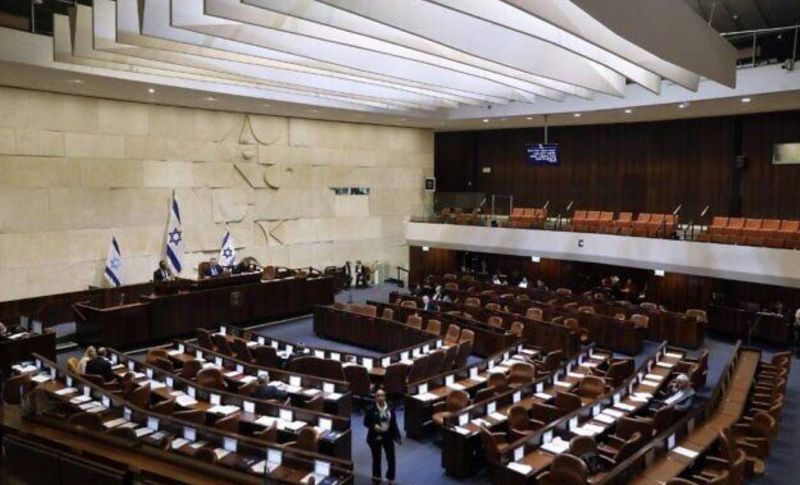
A general view of the Knesset in Jerusalem, December 11, 2019. (Credit: Menahem Kahana/AFP)
Within the chaos surrounding the protests against the judicial overhaul, the measure nearly went unnoticed.
With only seven MPs opposing and 39 in favor, the Knesset passed in third reading on Sunday July 30, 2023, an amendment providing heavier sentences for sexual crimes committed with “nationalist” motives.
Submitted by Limor Son Har-Melech of the far-right Otzma Yehudit party and Yulia Malinovsky of the secular right-wing Yisrael Beiteinu party, the bill was denounced by some activists and members of the opposition for encouraging legal discrimination against Palestinians.
The amendment, which has yet to be published in the official Gazette, adds sexual harassment to the list of “offenses motivated by racism or hostility towards the public,” which would be punishable by a double sentence.
The law also doubles the amount of compensation awarded to victims of sexual harassment if the offense is committed for “nationalist” reasons.
The state prosecutor is now required to report the number of such charges to the Knesset’s national security committee to monitor the progress of investigations.
‘The honor of Jewish women’
The co-drafters of the law claim it fits into a legal framework that aims to combat a “growing phenomenon of nationalist terrorism” whose instigators would be easy to find, if the “dozens of testimonies made by women who have been victims of sexual harassment during their bus journeys in the West Bank” are to be believed, said MP Limor Son Har-Melech during a debate.
“It would be unacceptable that the honor of Jewish women be violated by miscreants who get away with non-existent or ridiculous sentences,” Har-Melech added, as if to suggest that the background of the perpetrator should determine how serious and punishable the act is.
It is a sign of “the highly racialized political environment in Israel,” said Zaha Hassan, a human rights lawyer and a fellow at the Carnegie Endowment for International Peace.
The amendment barely conceals that Palestinians will therefore be incriminated and given punishments twice as heavy as their Jewish counterparts in cases of sexual offenses, which have now become politicized. Sexual assault or rapes committed against “Jewish women” would be “undoubtedly linked to the strong nationalism of this territory,” said Har-Melech, in reference to the occupied West Bank.
The law, which was enacted with astonishing consensus, comes at a time when the Israeli population is heavily polarized over judicial reforms. The judicial reforms in question aim to reduce the powers of the Supreme Court and are supported by the far-right wing cabinet. Tens of thousands of demonstrators have for months been protesting on the streets of major Israeli cities to denounce what they consider a coup de force by the cabinet on legal institutions.
Despite the political opposition’s indignation, the Palestinian issue remains outside the debates. “Right and left Israeli politicians agree on very little, but when it comes to the rights of defense and equal treatment of Palestinian citizens of Israel, they find common ground,” Hassan said.
Six of the seven MPs who voted against the law were Palestinian citizens of Israel and only one, Gilad Kariv, was a Jewish MP.
Demonizing Palestinian citizens
During the Knesset debates, the seven MPs warned of the discriminatory nature of the measure and called for “a major battle to stop the Kahanist tsunami,” in reference to the extremist Zionist ideology propounded by Rabbi Meir Kahane and his Kach party, which was banned almost 30 years ago.
Other more unusual parties voiced reservations against the law, such as the ultra-orthodox feminist group Nivcharot, which was involved in the preparation of the amendment. “Does an ultra-orthodox raping a 12-year-old girl do less harm or damage than a Palestinian Arab raping a 12-year-old girl?” the group asked.
“The use of legal mechanisms to encourage separation between ethno-religious or racial groups is a common practice in countries that discriminate,” said Hassan. For her the motivation behind the law is clear: demonizing Palestinian citizens and keeping them away from their Jewish neighbors.
In July 2022, for example, the Supreme Court of Israel ruled that the state can revoke an individual’s citizenship over offenses that constitute a “breach of loyalty,” allowing their deportation from the territory. This measure applies mainly to Palestinians.
For Hassan, the discriminatory nature of the law adds to the legal disparities already experienced by “Palestinian men,” who in “mixed cities” are already 3.7 percent more likely to be indicted than their Jewish counterparts.
Some have denounced that the law does not go both ways.What about the attacks committed by Israeli public servants against Palestinian women? Will they be punished equally? A report by the Association of Rape Crisis Centers in November 2022 indeed revealed an increase in sexual violence in the Israeli army, prisons and police.
This article was originally published in French in L'Orient-Le Jour. Translation by Joelle El Khoury.